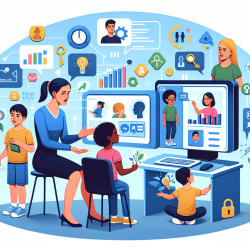As a Speech Language Pathologist (SLP) working in schools, you are likely aware of the numerous challenges and opportunities in delivering effective therapy. At TinyEYE, we understand the critical role you play in shaping young lives, particularly those requiring special education services. With the advent of telepractice, new tools and data-driven strategies are transforming how we approach speech therapy. This blog aims to explore how leveraging these innovations can lead to better outcomes for children.
The Importance of Data-Driven Decisions
In the realm of speech therapy, data is more than just numbers; it is the key to unlocking each child's potential. By systematically collecting and analyzing data, we can tailor interventions to meet individual needs more effectively. Here's why data-driven decisions are indispensable:
- Personalized Interventions: Data helps in crafting individualized treatment plans that address specific challenges and strengths.
- Progress Tracking: Continuous data collection allows for real-time monitoring of a child's progress, making it easier to adjust interventions as needed.
- Evidence-Based Practice: Utilizing data supports the implementation of evidence-based practices, ensuring that interventions are grounded in research and proven methodologies.
Tools that Make a Difference
Implementing data-driven decisions requires the right tools. At TinyEYE, we offer a suite of resources designed to make your job easier and more effective. Here are some key tools that can enhance your practice:
- Online Assessment Platforms: These platforms facilitate the efficient collection and analysis of data, allowing for comprehensive evaluations without the logistical challenges of in-person assessments.
- Telepractice Software: Our telepractice software is designed to support interactive and engaging therapy sessions, making it easier to connect with students remotely.
- Progress Monitoring Tools: These tools help in tracking student progress over time, providing valuable insights that can inform future interventions.
Case Studies: Real-World Impact
To illustrate the effectiveness of data-driven tools, consider the following case studies:
Case Study 1: Enhancing Communication Skills
A school district implemented our online assessment platform to evaluate students requiring speech therapy. The data collected revealed specific areas where students were struggling, enabling SLPs to develop targeted interventions. Within six months, there was a significant improvement in students' communication skills, as evidenced by both qualitative and quantitative data.
Case Study 2: Improving Engagement Through Telepractice
Another district utilized our telepractice software to deliver speech therapy sessions remotely. The interactive nature of the software kept students engaged, and the data collected during sessions provided insights into their progress. This approach not only improved engagement but also resulted in measurable gains in speech and language skills.
Taking the Next Step
Feeling inspired to enhance your practice with data-driven tools? Here are some actionable steps you can take:
- Explore Available Tools: Research and evaluate different tools that can support data-driven decisions in your practice.
- Implement Gradually: Start by integrating one or two tools into your practice and gradually expand as you become more comfortable.
- Collaborate with Colleagues: Share your experiences and insights with fellow SLPs to create a supportive community focused on continuous improvement.
At TinyEYE, we are committed to providing the resources and support you need to make a lasting impact. By leveraging data-driven tools, you can create personalized, effective interventions that lead to better outcomes for your students. Ready to take the next step? Explore our range of tools and see how they can transform your practice.










